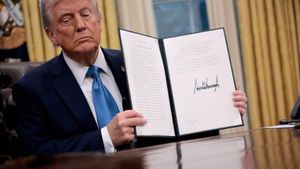Automaker stocks took a steep nosedive following President Donald Trump’s announcement of new tariffs on goods imported from Canada, Mexico, and China. The tariffs, which were imposed unexpectedly, included hefty 25% levies on both Canada and Mexico, and 10% on China, entering as markets opened on Monday. The immediate reaction was evident as shares of major automakers suffered significant blows on Wall Street.
General Motors (GM) saw its stock plunge by 8% to approximately $46.46 per share shortly after the market opened, marking one of the most alarming declines among the automakers. Ford Motor Company followed suit, with shares dropping nearly 5% as it traded at $9.69 each. Stellantis, which oversees several well-known automobile brands, also felt the wrath of the tariffs, plunging more than 5% to $12.43 per share within the first few minutes of trading.
This steep drop isn't unique to American brands; global counterparts have also been affected. Toyota and Nissan, Japanese manufacturers with substantial operations intertwined with North American supply chains, reported declines of 6% and 5% respectively. The ripple effects reached across continents, with European automakers like Volkswagen and BMW also witnessing declines as investors reacted to the potential economic fallout from the tariffs.
Economists and analysts have expressed concern over the long-term impacts these tariffs may have on both automakers and consumers. David Sowerby, managing director and portfolio manager for Ancora Advisors, articulated the stakes during the tumultuous trading day: “Tariffs could well be the catalyst to a correction,” he noted. His comments highlight the potential for significant market volatility as automakers brace themselves for increased costs and reduced consumer affordability.
The U.S. automotive industry operates like a finely tuned machine—with components and parts traded extensively between the U.S., Canada, and Mexico. Approximately 5.3 million vehicles are produced annually across borders, with around 70% destined for the U.S. market. Many models constructed within the U.S. are reliant on parts sourced from near neighbors. MEMA, the Motor & Equipment Manufacturers Association, asserted, "Such tariffs would have severe consequences for the U.S. vehicle supplier industry," underlining the vulnerabilities inherent within the existing manufacturing paradigm.
Add to this the stark reality of rising costs for consumers. A 25% tax applied to the average cost of vehicles—estimated at $25,000—could lead to price increases of nearly $6,250, potentially rendering cars and trucks increasingly unaffordable for the average American. Already grappling with economic pressures, this new layer of expense might push many prospective buyers out of the market altogether.
Many investors and industry observers remain skeptical about the wisdom of tariffs instituted without prior negotiation. The announcement prompted intense scrutiny from financial institutions, including BNP Paribas, which commented, “The announced increase in tariffs were even larger and came faster than we had penciled in.” This observation sheds light on the market's readiness for potential disruptions under Trump’s trade policy, which prioritizes aggressive action over diplomatic negotiation.
The tariffs have not only invoked fears of rising consumer prices but have also induced widespread uncertainty across stock markets. The Dow Jones Industrial Average reported declines of about 1.47%, with the initial panic subsiding somewhat later as investors re-evaluated the situational volatility. Despite the market finding some stable footing, UBS Global Wealth Management’s Chief Investment Officer Mark Haefele produced warnings concerning upcoming turbulence: "Tariffs are likely to represent an overhang on markets and contribute to volatility, at least until investors gain greater clarity on the path and destination of US trade policy."
While uncertainty looms large, Trump and Prime Minister Justin Trudeau of Canada had conversations intended to address the tariffs, but no resolutions were reached. Trump confirmed via social media about suspending tariffs on Mexico for one month, yet the 25% levies were set to take effect imminently, unraveling economic dialogues and stoking investor unease.
It's clear from the market response to Trump's trade policies, and the swift imposition of tariffs, just how closely the stock market—and economies—are intertwined with governmental policies. Analysts have indicated this turmoil could be the demarcation of challenging times for the automotive industry—unless constructive dialogue occurs and tariffs are either mitigated or lifted. Until then, the future for automakers remains uncertain, with the specter of tariff-induced instability casting long shadows over the market.



